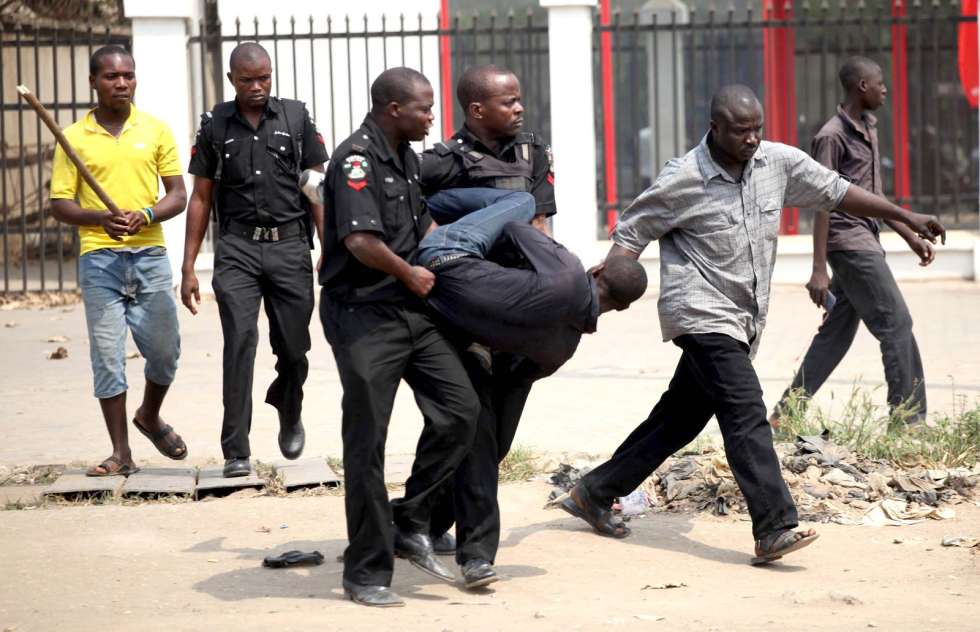
By Okechukwu Keshi Ukegbu
Recently, Nigerians woke up to what could be considered joke of the century. Abayomi Shogunle, an assistant commissioner of police,was quoted as saying that” another way of avoiding being killed by Special Anti-Robbery Squad (SARS) is not to speak Queens English to police officers”.
Unfortunately, Shogunle’s ridiculous advise came on the heels of a recent murder the alleged murder of Kolade Johnson by the operatives of Federal Special Anti- Robbery Squad(FSARS). This has renewed the fears of Nigerians that the fear of trigger happy cops is the beginning of fear in Nigeria, lending credence to the notion that Nigerians, with whose taxes these policemen are paid, are living on the mercies of these security who derive joy in sending innocent Nigerians to their early graves.
Speaking recently at the Public Tribunal on Police Corruption, Brutality and Abuse in Southern Nigeria in Owerri, Imo State,Uche Nwokocha, South East Coordinator of National Human Rights Commission (NHRC), accused the Nigeria Police Force of covering up for officers found guilty of extra-judicial killings. While, decrying the high level of impunity that exists within the Nigeria Police Force,Nwokocha stated that the Police shield erring officers from prosecution and transfer them to another station instead of holding them accountable for their actions and prosecuting them.
The revelation by the rights body has compelled analysts to believe that the alleged attitude of the police authorities of shedding culprits of extra-judicial killings among police officers have emboldened more officers to toe that path. After all, it is a common adage in the Nigerian parlance a child whose father sends on a criminal mission executes with impunity.
An extrajudicial killing is the killing of a person by governmental authorities or individuals without the sanction of any judicial proceeding or legal process. Extrajudicial punishments are mostly seen by humanity to be unethical, since they bypass the due process of the legal jurisdiction in which they occur.
The Police Act (Cap 359- Laws of the Federation of Nigeria), among other things empowers the police with duties of:prevention and detection of crime; preservation of law and order; apprehension and prosecution of offenders; enforcement of all laws; performance of military duties within or outside Nigeria as many required by them or under the authority of the act or any other; and, protection of life and property. While the argument of whether the police have lived up to the expectations of fulfilling other duties above may generate mixed positions, over 90 percent Nigerians will consent to the fact that the key function of protection of life and property has been performed to the reverse.
Numerous cases abound of extra- judicial killings by the police. 2004 Civil Liberties Organisation’s Year Book chronicling the state of human rights and governance in the year under review and entitled “Clear and Present Danger”, warned that ”If the government failed in 2004 to advance the democratisation process in the political sector, it also failed in the civil and social sectors .The government failed to curb the excesses of the public and other security agencies .The police remained the usual self and continued to maim and kill citizens in extra-judicial circumstances. This was quite apart from the act of extorting money from motorists and arresting innocent citizens for ransom. There is little doubt that the police and other security agencies are the source of the most egregious violations of civil rights, both in their political role as protectors of state security and their civil role as protectors of peace, law and order. These violations include not only those that occur in the streets, such as extortion, illegal arrest, and the use of undue force against citizens, but also detention without trial, torture and inhuman treatment, and extra-judicial killings”.
The year book also revealed how seventeen year old Izuchukwu Ayogu and Nnaemeka Ugwuoke whose mutilated bodies with eyes, brains, and reproductive organs,were found in a forest,after police in Nsukka arrested them on Sunday March 2001.The list is inexhaustible: The Ughelli 6 in 1983, Apo 6 in 2005, over 20 persons killed at Afiesere – Ughelli in 2006, Waliyu Abudu in 2008, Ramonni Balogun in 2013, Suzanna Alamagani in 2013, Ogbe Onokpite in November 2011, Aisagbonbuan Osagie, a truck driver, on 4th February 2014 in Benin city and Femi Awoyale on February, 2014.
We don’t want to delve into the argument of why our security agencies are still using live ammunition in the 21st century to demobilise mobs, while pepper spray and synthetic ammunition can serve the same purpose. That is an argument for another day.
Also, an article entitled” Weapon Handling and Phantom Discharge”, vested the security agents with responsibility of keeping the weapon pointed in a safe direction (where there would be no injuries to persons or damage to property in the event of a discharge); keeping the finger off the trigger until the gun is on a target and the decision to shoot is made;be sure of the target and the target backstop.
There have been calls to redesign the training of our security agencies to expose them to academic works on human psychology, human rights, and the constitution. The proponents of this arrangement also advocate a review of academic entry requirements of the security agencies. They are of the view that the proposal, if implemented, would go a long way in enhancing the security agencies’ performance and respect for the civil population.






